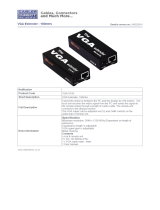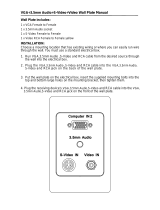
11
1. All transmission distances are measured using Belden 1583A CAT5e 125MHz Solid UTP cable
and ASTRODESIGN Video Signal Generator VG-859C. The transmission distance is defined as
the distance between the video source and the VGA display.
2. The transmission length is largely affected by the type of Cat- 5e / 6 cables, the type of VGA
sources, and the type of VGA display. The testing result shows solid UTP cables (usually in the
form of 330m [1,000ft] bulk cables) can transmit a lot longer signals than stranded UTP cables
(usually in the form of fixed length patch cords). Shielded STP cables are better suited than
unshielded UTP cables. A solid UTP CAT5e cable shows longer transmission range than
stranded STP CAT6 cable. For long extension users, solid UTP/STP cables are the only viable
choice.
3. To reduce the interference among the unshielded twisted pairs of wires in UTP cable, use
double shielded STP cables to improve EMI problems, which is worsen in long transmission.
4. Because the quality of the Cat- 5e / 6 cables has the major effect on how long the transmission
limit can achieve and how good is the received picture quality, the actual transmission range is
subject to one’s choice of Cat- 5e / 6 cables. For desired resolutions greater than 1080i or
1280x1024, a Cat-6 cable is recommended.
Performance Guide for VGA over RJ-45 /CAT5 Cable Transmission
Performance rating Type of category cable
Wiring Shielding CAT5 CAT5e CAT6
Solid
Unshielded (UTP)
Shielded (STP)
Stranded
Unshielded (UTP)
Shielded (STP)
Termination Please use EIA/TIA-568-B termination (T568B) at any time
NOTICE




















